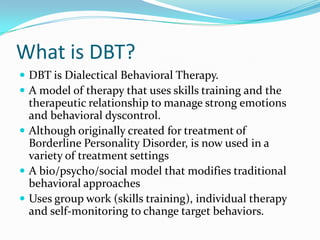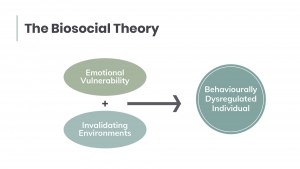DBT London: Where Hope and Healing Intersect for Lasting Adjustment
DBT London: Where Hope and Healing Intersect for Lasting Adjustment
Blog Article
Equipping People Via Effective Dialectical Behavior Therapy (DBT) Providers: Structure Stronger Mental Health Foundations
In the world of psychological health and wellness and well-being, the relevance of equipping individuals with efficient Dialectical Behaviour Treatment (DBT) services can not be overstated. By focusing on the core principles of DBT, such as boosting emotional law abilities, enhancing interpersonal effectiveness, developing distress resistance strategies, and cultivating mindfulness methods, people can embark on a journey towards structure stronger psychological health and wellness structures.
Understanding the Core Principles of DBT


One core concept of DBT is validation. Specialists using DBT acknowledge the person's sensations and actions as legitimate actions to their atmosphere. This validation helps build a strong healing partnership and encourages people to function towards modification. An additional essential facet is dialectics, which teaches individuals to check out scenarios from numerous viewpoints and locate the synthesis between conflicting ideas or emotions.
Additionally, the idea of dialectical abstaining is main to DBT. This principle urges people to avoid self-destructive actions while also accepting themselves. By comprehending and including these core principles, specialists can properly implement DBT methods and support people in their journey in the direction of emotional law and mental health.
Enhancing Emotional Policy Skills
Developing efficiency in taking care of emotions is an essential element of cultivating psychological wellness and interpersonal performance - DBT London. Enhancing emotional law abilities is a core element of Dialectical Practices Treatment (DBT) that equips people with the devices to navigate intense emotions in a healthy and positive fashion. Via DBT, individuals discover to determine, recognize, and manage their emotions, leading to improved psychological wellness results
DBT emphasizes the relevance of mindfulness, which entails being present in the moment without judgment. This technique permits individuals to observe their feelings without becoming overwhelmed by them, improving their ability to react successfully instead of respond impulsively. By growing mindfulness, individuals can develop a higher sense of self-awareness and psychological control.
Additionally, DBT educates practical skills such as distress resistance and emotion law strategies to assist people manage difficult emotions. By learning these abilities, individuals can reduce impulsive actions, enhance decision-making, and reinforce their relationships with others. Eventually, enhancing psychological guideline abilities via DBT encourages people to lead even more satisfying and well balanced lives.

Improving Interpersonal Effectiveness
Having established a solid foundation in emotional guideline skills within the framework of Dialectical Practices Therapy (DBT), the emphasis now moves in the direction of boosting interpersonal effectiveness. Improving social efficiency is an important part of DBT as it furnishes individuals with the necessary skills to browse social interactions, interact effectively, set boundaries, and construct healthier connections.
In DBT, interpersonal efficiency skills are instructed through modules that concentrate on areas such as assertiveness, effective interaction, and interpersonal analytical. By learning these skills, individuals can improve their capability to express their desires and demands, preserve self-regard, and develop more powerful links with others.
Exercising mindfulness is an visit our website indispensable component of enhancing social efficiency within the DBT framework. Mindfulness enables individuals to be existing in their communications, listen actively, and respond thoughtfully instead of respond impulsively. By integrating mindfulness into their daily lives, individuals can cultivate better self-awareness and psychological policy, which are vital for successful social interactions.
Building Distress Tolerance Techniques
Discovering reliable methods for taking care of psychological distress is necessary for people looking for to enhance their coping abilities and strength. Structure distress tolerance techniques is a crucial element of Dialectical Practices Therapy (DBT) that encourages individuals to browse difficult feelings without ending up being overloaded - DBT London. One basic technique in DBT for distress tolerance is the acronym "ACCEPTS," which stands for Activities, Adding, Comparisons, Feelings, Pushing away, Ideas, and Experiences. By utilizing these approaches, individuals can properly deal with stressful situations and control their psychological actions.
Furthermore, mindfulness techniques play a substantial function in structure distress tolerance. Mindfulness encourages people to remain present in the minute without judgment, enabling them to observe their ideas and feelings without reacting impulsively. This awareness allows individuals to tolerate distress better and establish a greater feeling of control over their responses.
Along with these techniques, producing an individualized distress tolerance strategy with the assistance of a skilled specialist can offer people with a customized technique to taking care of psychological distress - DBT London. By including these approaches right into life, individuals can reinforce their mental wellness structures and improve their total health

Cultivating Mindfulness Practices
To strengthen their distress resistance methods additionally, people can concentrate on cultivating mindfulness methods as a complementary approach within the structure of Dialectical Practices Treatment (DBT) Mindfulness, a key element of DBT, involves focusing on the here and now moment without judgment. By promoting mindfulness, individuals can boost their recognition of ideas, feelings, and bodily experiences, promoting a much deeper understanding of themselves and their experiences.
Mindfulness techniques in DBT include methods such as mindful breathing, Web Site body scans, and observing thoughts without attachment. These methods encourage people to develop a non-reactive position towards their inner experiences, enabling them to react to tough situations with greater clearness and calmness. By integrating mindfulness into everyday regimens, individuals can discover to manage their emotions better, lower impulsive actions, helpful site and cultivate a feeling of inner tranquility.
Via cultivating mindfulness methods, people undergoing DBT can build a strong structure for taking care of anxiety, boosting connections, and enhancing general well-being. By incorporating mindfulness right into their therapeutic trip, people can establish beneficial skills that encourage them to navigate life's obstacles with durability and self-awareness.
Final Thought
In conclusion, efficient Dialectical Behaviour Therapy (DBT) solutions play an important duty in encouraging individuals to construct more powerful mental wellness foundations. By understanding the core principles of DBT, enhancing psychological guideline skills, enhancing interpersonal effectiveness, building distress resistance strategies, and cultivating mindfulness techniques, individuals are furnished with the needed tools to browse their feelings, connections, and obstacles in a much more adaptive and resilient way. DBT services offer a comprehensive strategy to promoting mental health and empowering individuals to lead satisfying lives.
By focusing on the core concepts of DBT, such as boosting emotional guideline skills, enhancing social performance, building distress resistance methods, and cultivating mindfulness techniques, people can begin on a journey in the direction of structure more powerful psychological wellness structures. Enhancing emotional law abilities is a core component of Dialectical Behaviour Treatment (DBT) that equips individuals with the tools to navigate extreme emotions in a healthy and balanced and useful way.Furthermore, DBT instructs useful abilities such as distress tolerance and feeling regulation methods to aid people manage challenging feelings.To strengthen their distress tolerance techniques better, individuals can concentrate on cultivating mindfulness techniques as a complementary method within the framework of Dialectical Behaviour Therapy (DBT) By comprehending the core concepts of DBT, enhancing emotional regulation skills, boosting interpersonal performance, building distress tolerance methods, and growing mindfulness practices, people are furnished with the essential devices to browse their emotions, partnerships, and difficulties in an extra resistant and flexible manner.
Report this page